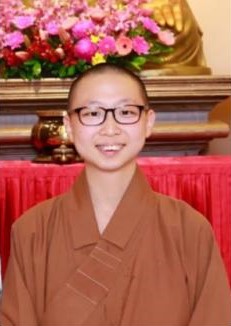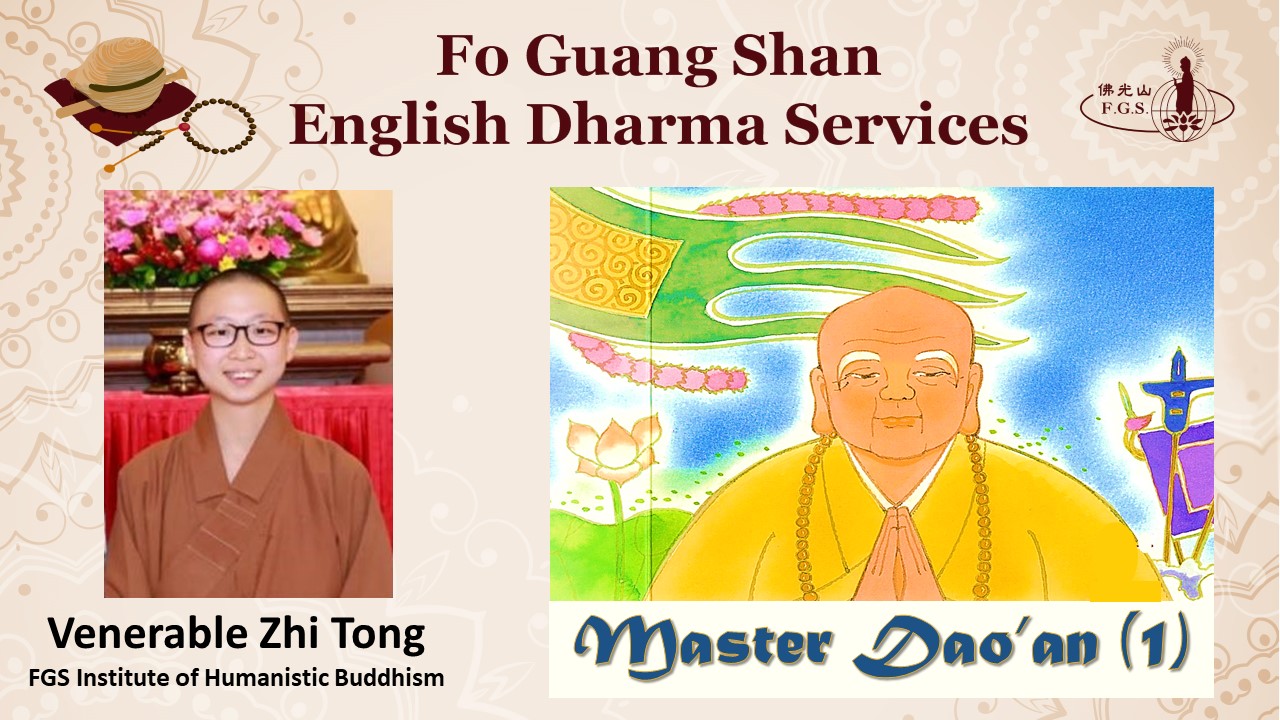
Speaker: Ven. Zhi Tong
Fo Guang Shan Institute of Humanistic Buddhism
I. Introduction
Auspicious greetings! How are you doing? Welcome back to a new episode of English Dharma Services. I am Zhi Tong. Today, I would like to begin a new mini series on the Biography of Buddhist Masters. Previously, I have introduced Master Kumarajiva and Master Huiyuan. They were great Buddhist masters in 4th century China, and lived during a time of continuous wars and political unrest. For this new mini series, I would like to introduce a Buddhist master closely connected with Master Kumarajiva and Master Huiyuan. This Buddhist master is the teacher of Huiyuan. He is also responsible for inviting Kumarajiva to China. His name is Master Dao’an.
II. Part 1: Birth and Renunciation
In the early 4th century, internal conflicts and uprising within the kingdom itself has once again torn the land of China apart. Tribes from the north took this opportunity and began their conquests southwards. Han Chinese living in the north fled southwards as northern tribes fought for the lands, and thus began a hundred years of continuous political conflicts.
Master Dao’an was born into such a time, and experienced such chaos throughout his life. Born into a family of scholars in Hebei, Dao’an lost his parents at a very young age and was placed in the care of his maternal uncle, who later schooled him in the Chinese classics and in the works of Laozi and Zhuangzi.
The first thing people might have noticed when seeing Dao’an was his appearance. He was a plain and dark child, with unattractive and uninspiring features. He was also marked with a black patch on his arm. But his appearance was only a mask of his incredible memory and intelligence. It was not clear why he chose to be a monastic, but it might be because the family of his maternal uncle could no longer support him. And so at the young age of 12, Dao’an became a monastic.
The first few years of his life as a monastic were spent doing physical labor. Dao’an’s master took a look at this dark and unattractive disciple, and sent him straight to work in the fields. However, Dao’an had no complaints. He worked dutifully and practiced accordingly without a thought of giving up.
After a few years, Dao’an thought he was ready to begin his study of the sutras, so he approached his teacher and asked for a text to read. His teacher did not think much about him, and gave him a short 5,000-character sutra. After coming back from the fields at night, Dao’an went to his teacher again and asked for another sutra.
“Have you already memorized the first sutra?” the teacher asked suspiciously.
“Yes, I have, teacher. Please give me another sutra. I would very much like to read more,” said Dao’an earnestly.
Though still suspicious, the teacher gave him another sutra that contains 10,000 characters. Dao’an took it happily and spent what time he had the next day reading and memorizing the sutra. When he returned at night, he gave the sutra back to his teacher.
“Teacher, I have memorized this sutra as well. May I have another one, please?”
The teacher was shocked. In the dim candlelight, he looked at this unassuming disciple whom he did not think much of. But in just two days, his opinion of Dao’an has changed drastically. The teacher took up the sutra.
“Well, let us have a quiz,” and began testing Dao’an if he really did manage to memorize the 10,000-character sutra all in a day.
After the test, the teacher felt ashamed. “Dao,an, you are not someone I can teach. You deserve a better teacher. After receiving your full ordination, I allow you to leave this temple and search for a better teacher.”
Dao’an bowed, “Thank you, teacher.”
III. Part 2: Studying Under Fotucheng
Soon after receiving the full ordination, Dao’an bade his teacher farewell and began his traveling and learning. During this time, there was a great Buddhist master named Fotucheng. Originally from the Western regions, Fotucheng came to China with the single vow of spreading Buddhism. With the Dharma and supernatural powers, Fotucheng influenced the brutal tribal rules of the north to become Buddhists and gradually changed their violent characters. Dao’an heard of Fotucheng and decided to learn from him.
When Fotucheng met Dao’an, he was not fooled by his dark and unassuming appearance. Fotucheng immediately knew this was a young monastic of great intelligence and potential. At this time, Dao’an was 24 years old, while Fotucheng was at the high age of 105. Through discussions, Fotucheng knew that Dao’an had a profound understanding of the Buddha-Dharma despite his young age, and wished to teach and train him as a better monastic. After expounding the Dharma to his disciples, Fotucheng would ask Dao’an to repeat the lecture, and sometimes, Fotucheng would even asked Dao’an to give a lecture on behalf of him. Fotucheng’s disciples were outraged. How could this dark and plain monk replace the wise old master? But after listening to Dao’an explanation, Fotucheng’s disciples were gradually won over. Indeed, Dao’an understanding of the Dharma was above them, and through his clear explanation, they could understand the Dharma much better.
Buddhism was still a relatively new religion and philosophy in China. Though Buddhism had been in China for three centuries at the time of Master Dao’an, the main focus was still on bringing Buddhist texts over to China and translating them. Hence, the people in China did not have a comprehensive understanding of Buddhism. They were still struggling to see the big picture by gathering bits and pieces of information from newly translated texts. Furthermore, given that the texts that were brought over contained a diverse range of Buddhist topics, it was a struggle for Buddhist translators to translate them lucidly. They had to rely on existing Chinese philosophy such as Daoism to explain the more profound and abstract ideas of Buddhism, such as sunyata or emptiness. Hence, Dao’an’s ability to clearly explain the Dharma was extremely important, given that Buddhism was still finding its way in China.
Another important aspect that Dao’an learned from Fotucheng was the importance of vinaya. Vinaya can be understood as the code of conduct that guides monastic life. It is a set of rules and regulations concerning every aspect of monastic life, therefore straight adherence to the vinaya is very important for Buddhist monastics. However, the lack of textual material, and more importantly, the contradictions sometimes found in vinaya text from different Indian Buddhist traditions created much confusion for Chinese Buddhists. In his traveling and studying, Dao’an must have met undisciplined monastics and temples without strict rules and regulations. But Fotucheng’s iron discipline, conduct, adherence to the Vinaya (rules of conduct for monks), and teaching of meditation greatly impressed Dao’an, since these were qualities that Chinese monks often lacked.
Dao’an continued his learning with Master Fotucheng for the next 20 years. After the death of Fotucheng at the age of 117, Dao’an was appointed the abbot of the national temple. During this years, Dao’an himself also became a teacher and had disciples and followers. It was also around this time that Dao’an began to see that Chinese Buddhism cannot keep relying on Daoism to explain profound Buddhist ideas. Not only will it hinder people from understanding of the right Dharma, it would also impede the spread of Buddhism. Despite contradictory opinions, Dao’an firmly said that teaching the Dharma accurately should be the priority. However, before he could do much on realizing his ideas, the king was killed, and the country was once again thrown into turmoil.
IV. Conclusion
Facing such a change, Dao’an decided to travel southwards, where the political situation was relatively stable. He gathered his 400 disciples, and they began to make their way down south in the thick of political unrest. What would happen to Dao’an and his disciples? Would they make it to a safe place? Tune in next week to find out!
Thank you for listening to this episode, may you find joy and inspiration fro the stories of great Buddhist masters. Omitofo.

